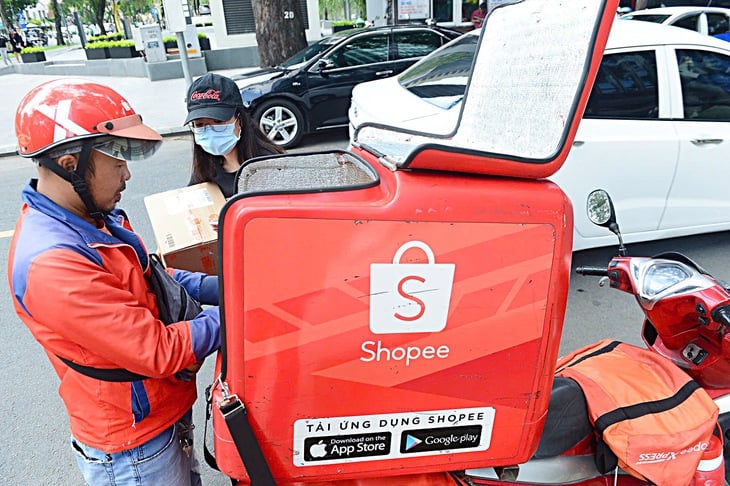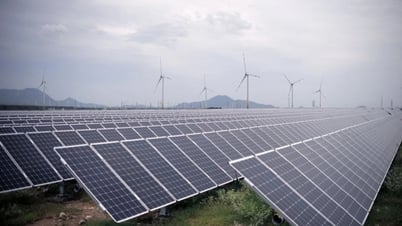
Shopee will collect an additional infrastructure fee of VND 3,000/order from July 1, 2025 - Photo: Q.DINH
According to experts, Shopee - the leading e-commerce platform in the Vietnamese market with about 2.4 million successfully delivered orders in 2024 (according to Metric) - increasing the fee by 3,000 VND/order, although not large, can create a big impact on both the platform, sellers and buyers.
What is frustrating is that, according to experts, small traders are put in a passive position, forced to accept without a choice.
Small traders worry that the more they sell, the more they lose.
"It's really too difficult, at this rate I'm afraid I won't be able to hold on, I'm too exhausted," Ms. T. Huong (HCMC) shared when hearing the news that Shopee was about to increase fees. According to the announcement, this 3,000 VND fee will be deducted directly from each successful order, or order with an accepted return/refund request.
"Each pen, eraser, ruler... only costs from 2,000 to 15,000 VND. If the platform charges an additional 3,000 VND/order, I will lose many orders right from the packaging stage. Not to mention being "bombed", the damage is even worse. Because the main customers are students, often buying small orders, it is very difficult to sell large orders," Mr. N. (HCMC) - another trader on the platform - worriedly said.
Many sellers of "super cheap" items such as aquarium miniatures and decorative models priced at only VND1,000 - 1,500 per product will also be under pressure from the increasing floor fee. "The product value is low, but the infrastructure fee is even higher, how can we sell it?", Mr. N. lamented.
According to records, most major e-commerce platforms such as Shopee, TikTok Shop, Lazada and Tiki apply various fees to sellers. However, Shopee is the only platform to implement an additional "infrastructure fee" of 3,000 VND/order, an unprecedented one. Previously, from April 2025, this platform also caused controversy when changing its fee structure.
In addition to the infrastructure fee that is about to be applied, small traders are also having to bear a series of other fees such as: 5% payment fee, platform commission up to 12%, advertising fee, shipping fee difference, value added tax (VAT), personal income tax, operating costs (personnel, packaging, returns...).
Thus, with a series of fees being applied, sellers on e-commerce platforms can have their revenue "eroded" by 15 - 40%, or even higher, depending on the industry and scale of operation.
"Not everyone sells technology, household appliances or clothes worth millions of dong, with a high profit margin. I sell affordable clothes, each item under 200,000 VND. The floor fee is constantly increasing, the profit is gradually decreasing, it is unclear whether we can survive," said Ms. Thanh (a small trader).
Small retail stores face the risk of "leaving" the market
Speaking to Tuoi Tre, Mr. Vo Quoc Hung, growth director of Tonkin Media Company, said that Shopee's increase of 3,000 VND in fee per order, although not large, could have a big impact on the platform, sellers and buyers.
For Shopee, the additional revenue of VND3,000/order can bring in about VND6.9 - 7.2 billion per year (equivalent to USD280,000 - 290,000). This is a source of compensation for the rapidly increasing operating costs, especially logistics costs, which have increased fourfold in the past 2 - 3 years, according to a report from Metric.
"The platform can use this money to upgrade infrastructure, improve delivery speed or increase free shipping programs such as Freeship Xtra, which helps more than 90% of orders to be free of shipping, retain buyers and increase total transaction value (GMV) in the context of fierce competition from TikTok Shop," Mr. Hung assessed.
In addition, increasing fees can also be a tool for Shopee to "filter" out small, ineffective shops, in order to focus on large shops or Shopee Mall, a group that accounts for up to 60% of GMV. However, according to Mr. Hung, with the above policy, Shopee also faces many consequences.
Fee increases often encounter resistance from sellers, similar to the previous increase in commission fees from 4% to 9.5% in the mother and baby industry, which caused more than 12,000 complaints sent to the Ministry of Industry and Trade in the first quarter of 2025.
The VND3,000 infrastructure fee may continue to increase the backlash, especially among small shops with low profit margins. The report from Metric also shows that the number of standard booths/shops has decreased from 276,000 to 188,000 by the end of 2024, a trend that may continue if the cost of sales increases further.
In addition, the platform is also under pressure from the management agency. The Ministry of Industry and Trade has asked Shopee and TikTok Shop to report in detail the fee structure to avoid abusing their market position. If complaints increase, it is possible that the authorities will intervene.
For sellers, especially small traders, the 3,000 VND fee has a big impact. Especially for orders of only 50,000 - 100,000 VND, this fee is equivalent to 3 - 6% of additional costs, eating deeply into already thin profits.
Many shops are forced to raise prices to cover the fee, but this can cause them to lose customers, because Vietnamese consumers are very price-sensitive. In addition, consumers are also indirectly affected. If sellers raise prices to cover the fee, customers may have to pay more.

Both sellers and buyers are worried when Shopee charges additional fees - Photo: Q.D.
What does Shopee say about infrastructure fees?
The 3,000 VND/order announced by Shopee is an infrastructure fee used "to continue upgrading and developing infrastructure, technology and continuously improve the shopping experience for both buyers and sellers".
More specifically about the "infrastructure" equipped by the platform and charging sellers, Shopee representative said that it is: applying AI to chat boxes (chatbots), improving product image quality with AI, applying technology and investing heavily in the logistics system.
"These improvements not only help sellers improve their professionalism and competitiveness in the market, but also bring a more seamless and modern shopping experience to users," explained a Shopee representative.
Before applying infrastructure fees to sellers, Shopee also announced that it would stop supporting return/refund requests for the reason "the goods are intact but no longer needed" from buyers for sellers not on Shopee Mall.
According to Shopee's explanation, this change will help sellers reduce operating costs, while encouraging buyers to consider more carefully before making a purchase decision. "Shopee still maintains other buyer protection policies, ensuring rights when products have manufacturer defects, are not as described or are damaged during shipping," said a representative of the platform.
However, from July 1, Shopee also launched the "0 VND shipping fee for all orders" program on the entire platform. Accordingly, all Vietnamese consumers, regardless of rural or urban areas, can buy any product (under 15kg; excluding some other specific regulations) on Shopee without having to pay shipping fees.
"The biggest difference of Shopee's free shipping program this time is that users do not need to hunt for voucher codes, there is no limit on order value (under 15kg), no limit on the number of orders that can be purchased and no need to wait for campaign days or mega sale seasons," said a representative of this platform.
* MSc. NGUYEN PHAM HOANG HUY (Head of E-commerce Department,FPT Polytechnic HCM):
The floor is imposed, the seller is passive.

Shopee's decision to add a new fee called "infrastructure fee" is unreasonable. The decision was made unilaterally, without consulting the opinions of sellers, who are directly bearing the costs and risks. Small businesses are put in a passive position, forced to accept without a choice.
With such an imposing way of operating, small traders are also worried that the platforms will continue to increase many other types of fees in the future. Not to mention, sellers also have to face having their accounts locked if customers refuse to receive, return or give negative feedback many times. This further increases the risk. Besides, sellers currently have almost no control over anything on the platform.
All policies and regulations are set by the platform, sellers are not allowed to comment, if they do not follow, they will not be allowed to sell. For example, the platform applies free shipping for all orders, even for small items like hair clips, while each order has to bear staff fees, operating fees, and a series of fees set by the platform.
In the contract signed with the merchants, the e-commerce platform holds the upper hand, has the right to adjust and increase fees according to business strategy. Meanwhile, the situation of fake goods, counterfeit goods, goods that infringe intellectual property... is still rampant on e-commerce platforms, affecting genuine sellers, allowing an unhealthy competitive environment to exist for a long time.
* Mr. HUYNH HO DAI NGHI (public policy and international relations expert):
The salesperson was put in a "fait accompli" situation.

In terms of digital economic principles, Shopee's decision to add new fees is not a surprising decision. After many years of "burning money" to build the ecosystem, the trend of e-commerce platforms starting to shift to collecting sustainable fees from sellers is an international trend. Amazon, eBay, Alibaba... have all operated in this direction for a long time.
However, applying a fixed fee - with a threshold of 3,000 VND for all orders - regardless of value or industry characteristics, will certainly create a reaction in the online merchant community, especially the low-cost, low-capital sales group.
While the policy of charging fees is reasonable, the lack of seller stratification, consultation mechanisms and transparency in information on fee usage makes many people feel "put in a fait accompli". In a fair trade environment, every decision needs to be co-designed with the community it directly affects.
At that time, it was clear that many small retailers were forced to increase prices, combine orders or withdraw from the platform. Some low-priced products were eliminated because they could not cover costs, causing consumers - especially those in the low-income group - to lose diverse options and good prices.
For many small traders, especially small businesses, rural businesses, student startups, and freelance workers, e-commerce is not only a way to make money but also the only opportunity to stay in the digital economy.
When policies are applied across the board instead of stratifying sellers, the price to pay is not just profits, but the exit of the ecosystem by those who can no longer "take the heat". This goes against the principle of sustainable and inclusive development that the digital economy is committed to: leaving no one behind.
Shopee occupies No. 1 market share of Vietnam's e-commerce
According to the "Online Retail Market Overview Report 2024 and Forecast 2025" from the Metric data research platform, the total sales of the top 5 popular e-commerce platforms in Vietnam including Shopee, TikTok Shop, Lazada, Tiki and Sendo in 2024 will reach 318,900 billion VND.
As of early 2025, Shopee still maintains its leading position in the e-commerce market in Vietnam with 62% market share. However, after the initial phase of promoting to expand market share, this platform has recently continuously applied a series of new policies, increasing and adding many types of fees. This has greatly affected small retailers and those who sell products with low profit margins.
Source: https://tuoitre.vn/shopee-thu-phi-ha-tang-kho-cho-cua-hang-nho-20250620074139678.htm








































































































Comment (0)